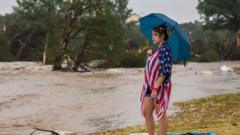A report from U.S. think tanks reveals that North Korea misrepresented the COVID-19 crisis, severely underreporting cases and deaths. Interviews from within the country indicate widespread health neglect and human suffering due to government denial and restrictive measures.
Unveiling North Korea’s Pandemic Deception: A Report on Health Crisis Mismanagement

Unveiling North Korea’s Pandemic Deception: A Report on Health Crisis Mismanagement
New research indicates that North Korea's claims of a miraculous defeat of COVID-19 were grossly exaggerated, leaving citizens without adequate healthcare and access to assistance.
In a startling revelation, a recent report by the Center for Strategic and International Studies and the George W. Bush Institute claims that North Korea's assertion of triumphing over the COVID-19 pandemic is a gross misrepresentation. While the North Korean government publicly touted that it had only recorded 74 deaths and hailed this achievement as a “miracle,” the truth appears far darker, according to interviews conducted with 100 North Korean citizens.
As the pandemic unfolded, severe economic and public health conditions deteriorated for many North Koreans, exacerbated by their government's refusal to acknowledge the reality of the virus's spread during the pandemic's early years. The report suggests that the government's outright denial and its reluctance to accept international aid significantly undermined the population's health and safety.
Sources for the report engaged in personal discussions with North Korean citizens, revealing alarming anecdotes about the state of public health. One woman recounted a winter in 2020 when multiple deaths in nursing homes led to a critical shortage of coffins. The report indicates that distress and fatalities related to suspected COVID-19 cases were prevalent in North Korea long before the country announced its first official outbreak in May 2022. “The government’s negligence was nothing short of abominable,” the report emphasized.
Access to vaccines and essential medications was virtually nonexistent, despite their global availability for over a year. Disturbingly, nearly 90 of the 100 individuals interviewed had never been tested for COVID-19, and many reported they had not received vaccines throughout the pandemic. Almost all respondents expressed suspicion that they or acquaintances had been infected, with no means to confirm such suspicions.
The pervasive climate of fear and government repression led local health officials to misreport COVID-19 fatalities and diagnoses to align with the government’s narrative. Citizens were similarly compelled to conceal their health issues, fearing state-imposed penalties such as detention or enforced lockdowns, which would worsen already critical food shortages.
As the truth of North Korea's pandemic response slowly emerges, the stories collected in this report shine a light on the grim realities faced by citizens, raising urgent questions about public health policy and governance under the repressive regime.





















